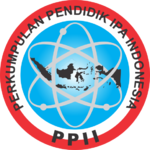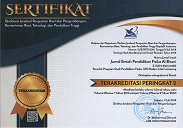Comparative Analysis and the Influence of Science Process Skills on Students' Digital Literacy on Measurement Materials
Abstract
Keywords
Full Text:
PDFReferences
Abrosimova, G. A. (2020). Digital literacy and digital skills in university study. International Journal of Higher Education, 9(8), 52–58. https://doi.org/10.5430/ijhe.v9n8p52
Akayoğlu, S., Satar, H. M., Dikilitaş, K., Cirit, N. C., & Korkmazgil, S. (2020). Digital literacy practices of Turkish pre-service EFL teachers. Australasian Journal of Educational Technology, 36(1), 85–97. https://doi.org/10.14742/ajet.4711
Al-Ababneh, M. M. (2020). Linking Ontology, Epistemology and Research Methodology. Science & Philosophy, 8(1), 75–91. https://doi.org/10.23756/sp.v8i1.500
Alfia, N., Sumardi, S., & Kristina, D. (2020). Survival Skills in Digital Era: An Integration of Digital Literacy into EFL Classroom. Indonesian Journal of EFL and Linguistics, 5(2), 435. https://doi.org/10.21462/ijefl.v5i2.307
Allam, F. C., & Martin, M. M. (2021). Issues and Challenges in Special Education: a Qualitative Analysis From Teacher’S Perspective. Southeast Asia Early Childhood Journal, 10(1), 37–49. Retrieved from http://ejournal.upsi.edu.my/index.php/SAECJhttps://doi.org/10.37134/saecj.vol10.1.4.2021http://ejournal.upsi.edu.my/index.php/SAECJ
Anthonysamy, L., Koo, A. C., & Hew, S. H. (2020). Self-regulated learning strategies in higher education: Fostering digital literacy for sustainable lifelong learning. Education and Information Technologies, 25(4), 2393–2414. https://doi.org/10.1007/s10639-020-10201-8
Beemt, A. Van den, MacLeod, M., Veen, J. Van der, Ven, A. Van de, Baalen, S. van, Klaassen, R., & Boon, M. (2020). Interdisciplinary engineering education: A review of vision, teaching, and support. Journal of Engineering Education, 109(3), 508–555. https://doi.org/10.1002/jee.20347
Bikmukhametov, T., & Jäschke, J. (2020). Combining machine learning and process engineering physics towards enhanced accuracy and explainability of data-driven models. Computers and Chemical Engineering, 138. https://doi.org/10.1016/j.compchemeng.2020.106834
Bravo, M. C. M., Chalezquer, C. S., & Serrano-Puche, J. (2021). Meta-framework of digital literacy: Comparative analysis of 21st century skills frameworks. Revista Latina de Comunicacion Social, 2021(79), 76–110. https://doi.org/10.4185/RLCS-2021-1508
Brenig, C., Schwarz, J., & Rückeshäuser, N. (2016). Value of Decentralized Consensus Systems - Evaluation framework. European Conference on Information Systems, 1(1).
Campbell, S., Greenwood, M., Prior, S., Shearer, T., Walkem, K., Young, S., … Walker, K. (2020). Purposive sampling: complex or simple? Research case examples. Journal of Research in Nursing, 25(8), 652–661. https://doi.org/10.1177/1744987120927206
Churchill, N. (2020). Development of students’ digital literacy skills through digital storytelling with mobile devices. Educational Media International, 57(3), 271–284. https://doi.org/10.1080/09523987.2020.1833680
Darmaji, D., Astalini, A., Kurniawan, D. A., & Aldila, F. T. (2022). Gender and Perception: Implementation of Web-based Character Assessment in Science Learning. Journal of Education Research and Evaluation, 6(1), 131–142. https://doi.org/10.23887/jere.v6i1.37737
Dewi, C. A., Erna, M., Martini, Haris, I., & Kundera, I. N. (2021). Effect of Contextual Collaborative Learning Based Ethnoscience to Increase Student’s Scientific Literacy Ability. Journal of Turkish Science Education, 18(3), 525–541. https://doi.org/10.36681/tused.2021.88
Dewi, C. A., Pahriah, & Purmadi, A. (2021). The Urgency of Digital Literacy for Generation Z Students in Chemistry Learning. International Journal of Emerging Technologies in Learning, 16(11), 88–103. https://doi.org/10.3991/ijet.v16i11.19871
Dilek, H., Tasdemir, A., Konca, A. S., & Baltaci, S. (2020). Preschool Children’s Science Motivation and Process Skills during Inquiry-Based STEM Activities. Journal of Education in Science, Environment and Health, 6(2), 92–104. https://doi.org/10.21891/jeseh.673901
Ekhsan, M., & Setiawan, I. (2021). The Role of Motivation Mediation on the Effect of Transformational Leadership Style on Employee Performance. International Journal of Management Science and Information Technology, 1(1), 35. https://doi.org/10.35870/ijmsit.v1i1.23
Ernawati, M. D. W., Asrial, A., Perdana, R., Septi, S. E., Rohana, S., & Nawahdani, A. M. (2022). Evaluation of Students’ Interest, Attitudes, and Science Process Skills in Science Subjects. Journal of Education Research and Evaluation, 6(1), 181–194. https://doi.org/10.23887/jere.v6i1.37583
Erwin, K., & Mohammed, S. (2022). Digital Literacy Skills Instruction and Increased Skills Proficiency. International Journal of Technology in Education and Science, 6(2), 323–332. https://doi.org/10.46328/ijtes.364
Falloon, G. (2020). From digital literacy to digital competence: the teacher digital competency (TDC) framework. Educational Technology Research and Development, 68(5), 2449–2472. https://doi.org/10.1007/s11423-020-09767-4
Haryadi, R., & Pujiastuti, H. (2020). PhET simulation software-based learning to improve science process skills. Journal of Physics: Conference Series, 1521(2). https://doi.org/10.1088/1742-6596/1521/2/022017
Haryani, J. (2023). Digital Literacy: Classroom Action Research for Vocational High School Students’. Journal Evaluation in Education (JEE), 4(2), 40–45. https://doi.org/10.37251/jee.v4i2.315
Hawari, A. D. M., & Noor, A. I. M. (2020). Project Based Learning Pedagogical Design in STEAM Art Education. Asian Journal of University Education, 16(3), 102–111. https://doi.org/10.24191/ajue.v16i3.11072
Husain, F. N. (2021). Digital Assessment Literacy: The Need of Online Assessment Literacy and Online Assessment Literate Educators. International Education Studies, 14(10), 65. https://doi.org/10.5539/ies.v14n10p65
Ilma, S., Al-Muhdhar, M. H. I., Rohman, F., & Saptasari, M. (2020). The correlation between science process skills and biology cognitive learning outcome of senior high school students. JPBI (Jurnal Pendidikan Biologi Indonesia), 6(1), 55–64. https://doi.org/10.22219/jpbi.v6i1.10794
Kamid, K., Rohati, R., Rahmalisa, Y., Anggo, M., Septi, S. E., Azzahra, M. Z., & Nawahdani, A. M. (2021). Engklek Game” in mathematics: How difference and relationship student attitude towards science process skills? Cypriot Journal of Educational Sciences, 16(6), 3109–3123. https://doi.org/10.18844/cjes.v16i6.6500
Katz-Buonincontro, J., & Anderson, R. C. (2020). A Review of Articles Using Observation Methods to Study Creativity in Education (1980–2018). Journal of Creative Behavior, 54(3), 508–524. https://doi.org/10.1002/jocb.385
Khasawneh, M. A. S. (2024). Beyond digital platforms: Gamified skill development in real-world scenarios and environmental variables. International Journal of Data and Network Science, 8, 213–220. https://doi.org/10.5267/j.ijdns.2023.10.002
Kim, J., Lee, H., & Cho, Y. H. (2022). Learning design to support student-AI collaboration: perspectives of leading teachers for AI in education. Education and Information Technologies, 27(5), 6069–6104. https://doi.org/10.1007/s10639-021-10831-6
Liu, Z. J., Tretyakova, N., Fedorov, V., & Kharakhordina, M. (2020). Digital literacy and digital didactics as the basis for new learning models development. International Journal of Emerging Technologies in Learning, 15(14), 4–18. https://doi.org/10.3991/ijet.v15i14.14669
Manik, E. (2020). Learning With Higher Order Thinking Skills for Basic Statistics Subject. 488(Aisteel), 224–230.https://doi.org/10.2991/assehr.k.201124.048
Mohajan, H. (2020). Quantitative Research: A Successful Investigation in Natural and Social Sciences. Journal of Economic Development, Environment and Students, 9(4), 52–79. Retrieved from https://mpra.ub.uni-muenchen.de/105149/
Morgan, A., Sibson, R., & Jackson, D. (2022). Digital demand and digital deficit: conceptualizing digital literacy and gauging proficiency among higher education students. Journal of Higher Education Policy and Management, 44(3), 258–275. https://doi.org/10.1080/1360080X.2022.2030275
Mõttus, R., Wood, D., Condon, D. M., Back, M. D., Baumert, A., Costantini, G., … Zimmermann, J. (2020). Descriptive, Predictive and Explanatory Personality Research: Different Goals, Different Approaches, but a Shared Need to Move Beyond the Big Few Traits. European Journal of Personality, 34(6), 1175–1201. https://doi.org/10.1002/per.2311
Napal, M., Mendióroz-Lacambra, A. M., & Peñalva, A. (2020). Sustainability teaching tools in the digital age. Sustainability (Switzerland), 12(8), 1–14. https://doi.org/10.3390/SU12083366
Phaeton, M. J., & Stears, M. (2017). Exploring the alignment of the intended and implemented curriculum through teachers’ interpretation: A case study of A-level Biology practical work. Eurasia Journal of Mathematics, Science and Technology Education, 13(3), 723–740. https://doi.org/10.12973/eurasia.2017.00640a
Okagbue, H. I., Oguntunde, P. E., Obasi, E. C. M., & Akhmetshin, E. M. (2021). Trends and usage pattern of SPSS and Minitab Software in Scientific research. Journal of Physics: Conference Series, 1734(1). https://doi.org/10.1088/1742-6596/1734/1/012017
Ozkan, G., & Umdu Topsakal, U. (2021). Investigating the effectiveness of STEAM education on students’ conceptual understanding of force and energy topics. Research in Science and Technological Education, 39(4), 441–460. https://doi.org/10.1080/02635143.2020.1769586
Queiruga-Dios, M. Á., López-Iñesta, E., Diez-Ojeda, M., Sáiz-Manzanares, M. C., & Dorrío, J. B. V. (2020). Citizen science for scientific literacy and the attainment of sustainable development goals in formal education. Sustainability (Switzerland), 12(10). https://doi.org/10.3390/su12104283
Romadhona, R. R., & Suyanto, S. (2020). Enhancing integrated science process skills: Is it better to use open inquiry or guided inquiry model? Biosfer: Jurnal Pendidikan Biologi, 13(2), 307–319. https://doi.org/10.21009/biosferjpb.v13n2.307-319
Safaruddin, S., Ibrahim, N., Juhaeni, J., Harmilawati, H., & Qadrianti, L. (2020). The Effect of Project-Based Learning Assisted by Electronic Media on Learning Motivation and Science Process Skills. Journal of Innovation in Educational and Cultural Research, 1(1), 22–29. https://doi.org/10.46843/jiecr.v1i1.5
Sakerni, Suhaimi, Wahdini, E., & Amberansyah. (2021). Principal Leadership and Teacher Work Motivation Synergize with Kindergarten Teacher Performance in Banjarmasin City. Journal of Advances in Education and Philosophy, 5(7), 193–204. https://doi.org/10.36348/jaep.2021.v05i07.004
Sarker, I. H. (2021). Machine Learning: Algorithms, Real-World Applications and Research Directions. SN Computer Science, 2(3), 1–21. https://doi.org/10.1007/s42979-021-00592-x
Sharma, A., Kosasih, E., Zhang, J., Brintrup, A., & Calinescu, A. (2022). Digital Twins: State of the art theory and practice, challenges, and open research questions. Journal of Industrial Information Integration, 30(November 2020), 100383. https://doi.org/10.1016/j.jii.2022.100383
Shatri, Z. G. (2020). Advantages and disadvantages of using information technology in learning process of students. Journal of Turkish Science Education, 17(3), 420–428. https://doi.org/10.36681/tused.2020.36
Suchyadi, Y., Safitri, N., & Sunardi, O. (2020). the Use of Multimedia As an Effort To Improve Elementary Teacher Education Study Program College Students’ Comprehension Ability and Creative Thinking Skills in Following Science Study Courses. Jhss (Journal of Humanities and Social Studies), 4(2), 201–205. https://doi.org/10.33751/jhss.v4i2.2549
Taherdoost, H. (2022). What are Different Research Approaches? Comprehensive Review of Qualitative, Quantitative, and Mixed Method Research, Their Applications, Types, and Limitations. Journal of Management Science & Engineering Research, 5(1), 53–63. https://doi.org/10.30564/jmser.v5i1.4538
Tinmaz, H., Lee, Y. T., Fanea-Ivanovici, M., & Baber, H. (2022). A systematic review on digital literacy. Smart Learning Environments, 9(1), 1–18. https://doi.org/10.1186/s40561-022-00204-y
Tohara, A. J. T., Shuhidan, S. M., Bahry, F. D. S., & Nordin, M. N. bin. (2021). Exploring Digital Literacy Strategies for Students with Special Educational Needs in the Digital Age. Turkish Journal of Computer and Mathematics Education (TURCOMAT), 12(9), 3345–3358. Retrieved from https://www.turcomat.org/index.php/turkbilmat/article/view/5741
Toyon, M. A. S. (2021). Explanatory sequential design of mixed methods research: Phases and challenges. International Journal of Research in Business and Social Science (2147- 4478), 10(5), 253–260. https://doi.org/10.20525/ijrbs.v10i5.1262
Triandayani, A., Fadlozi, Y. M., Barzegar, S., & Quijano JR, G. N. (2024). Increasing Students’ Digital Literacy Through the Use of Google Cardboard Media on the Theme of My Dreams In Class IV of Elementary School. Indonesian Journal of Education Research (IJoER), 5(1), 35–42. https://doi.org/10.37251/ijoer.v5i1.872
Tomczyk, Ł. (2020). Skills in the area of digital safety as a key component of digital literacy among teachers. Education and Information Technologies, 25(1), 471–486. https://doi.org/10.1007/s10639-019-09980-6
Tytova, N. (2022). Digital literacy of future teachers in the realities of large-scale military aggression (Ukrainian experience). Futurity Education, 2, 43–54. https://doi.org/10.57125/fed/2022.10.11.33
Wennberg, K., & Anderson, B. S. (2020). Editorial: Enhancing the exploration and communication of quantitative entrepreneurship research. Journal of Business Venturing, 35(3), 1–11. https://doi.org/10.1016/j.jbusvent.2019.05.002
Widiana, I. W. (2020). The Effect of Digital Literacy on the Ability of Teachers to Develop HOTS-based Assessment. Journal of Physics: Conference Series, 1503(1), 1–9. https://doi.org/10.1088/1742-6596/1503/1/012045
Winarni, E. W., Hambali, D., & Purwandari, E. P. (2020). Analysis of language and scientific literacy skills for 4th grade elementary school students through discovery learning and ict media. International Journal of Instruction, 13(2), 213–222. https://doi.org/10.29333/iji.2020.13215a
Winda, F. R., & Shofiardin, M. (2023). Describing the Ability of Science Processes in Basic Physics Practicum II Material of Ice Melting Heat Using E-Modules. Schrödinger: Journal of Physics Education, 4(1), 18–23. https://doi.org/10.37251/sjpe.v4i1.492
DOI: http://dx.doi.org/10.24042/jipfalbiruni.v13i2.22986
Refbacks
- There are currently no refbacks.

Jurnal ilmiah pendidikan fisika Al-Biruni is licensed under a Creative Commons Attribution-ShareAlike 4.0 International License.
![]()







